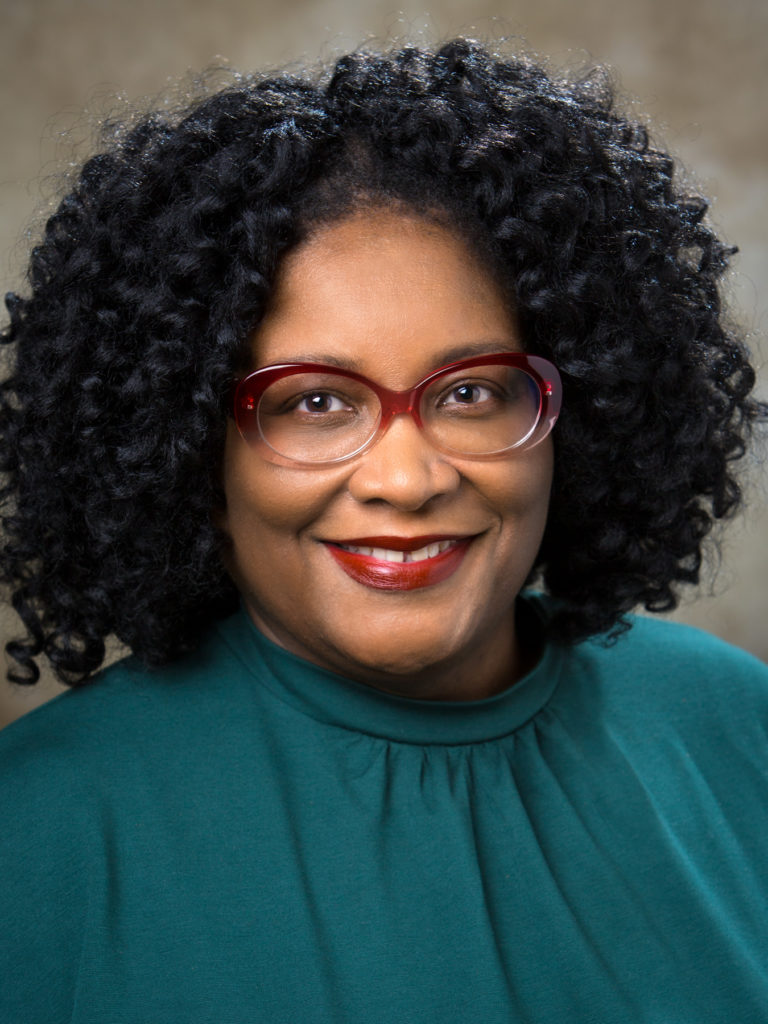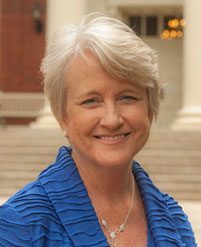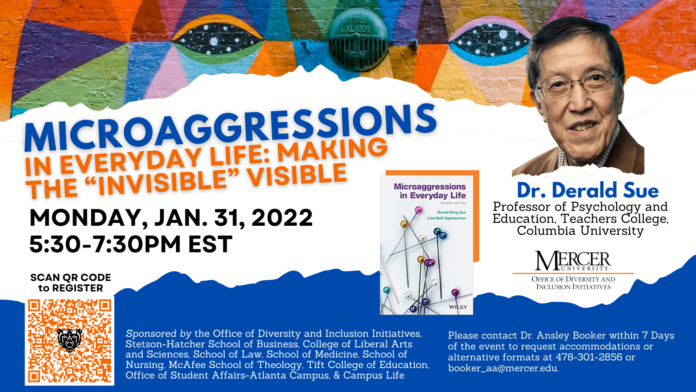A seemingly innocent, insignificant comment or behavior can have a detrimental effect on the person to whom it’s directed. Microaggressions are commonplace interactions that communicate a bias — often unintentionally — toward a marginalized individual or group, and chances are, you’ve committed or experienced one.
An upcoming University event aims to educate Mercerians and community members about microaggressions and equip them with intervention skills to address them. “Microaggressions in Everyday Life: Making the ‘Invisible’ Visible” will take place from 5:30-7:30 p.m. Jan. 31 on Zoom and be led by a renowned scholar on the subject, Dr. Derald Wing Sue.

The event is sponsored by Mercer’s Office of Diversity and Inclusion Initiatives in partnership with Mercer’s College of Education, College of Liberal Arts and Sciences, School of Business, School of Law, School of Medicine, School of Nursing, School of Theology, Office of Students Affairs-Atlanta campus and Campus Life. It is open to all Mercer students, faculty, staff and alumni, as well as the community. Attendees must register online to join the conversation, said Dr. Ansley Booker, director of the Office of Diversity and Inclusion Initiatives.
“We’ve really made an effort over the last three years to be in front of the conversations about diversity, equity and inclusion, so I see this as an important component of that conversation,” said Dr. Anita Gustafson, dean of the College of Liberal Arts and Sciences, which created its own diversity and inclusion committee in 2020. “We have a very diverse student body, and we hope to have an increasingly diverse faculty, but in the meantime, I think it’s really important for us to have those conversations.”
Dr. Sue, professor of education and psychology at the Teachers College of Columbia University, is a leading expert on discrimination issues. His research has been featured in more than 150 publications, and he has authored several books, including “Microaggressions in Everyday Life” and “Microaggressions and Marginality.” During the webinar, Dr. Sue will explain microaggressions and their impact, walk through his intervention toolkit, and answer questions from the audience, Dr. Booker said.

“This is phenomenal for Mercer to have (Dr. Sue) speak,” said Wanda Thomas, chief diversity officer for the School of Medicine. “Getting a chance to listen to someone with the caliber of Dr. Sue and to be in an intimate type of atmosphere, even though it’s virtual, is a great opportunity to learn more about ourselves and how to be more respectful to everyone and to be more inclusive to everyone’s culture, needs and experiences.”
Dr. Booker said she has seen an uptick in requests for presentations on microaggressions by Mercer departments and student organizations over the last couple years. While the term microaggression is nothing new in academia, it started to be talked about more widely in 2020 amid increased efforts for racial justice and reconciliation. People were able to put a name to what they had experienced and had a desire to understand it better.
Dr. Booker wanted Mercer to have a strategy to identify, disarm and move past microaggressions, and the Jan. 31 event will serve as a development tool to ensure the University is welcoming to all.

“Sometimes people don’t understand that these daily invalidations and comments can be detrimental to making our classrooms and community inclusive,” Dr. Booker said. “Most people think that if it’s not overt racism, sexism or classism, it’s not wrong.”
That’s why many people are shocked when they realize they have committed a microaggression, she said. They may think they gave someone a compliment, when it actually was an insult rooted in bias.
Microaggressions often end up “flying under the radar,” and it’s especially important for faculty and staff to be cognizant of how their words can be perceived differently than they intended, Dr. Gustafson said. The event will be a chance for participants to become more informed and discover ways to be respectful of all members of their community.
“Microaggressions, sometimes we don’t even know that we’ve done it,” Thomas said. “Just because it says ‘micro,’ it doesn’t mean it’s small. The impacts of it can be harmful. We don’t want to continue to harm people not knowing we’ve done it. Come out and be educated so we can be aware of everyone’s experiences.”
Questions for the Q&A portion of the event can be sent in advance to booker_aa@mercer.edu. The event will not be recorded, but the slides and intervention toolkit from Dr. Sue’s presentation will be made available online after the event.










